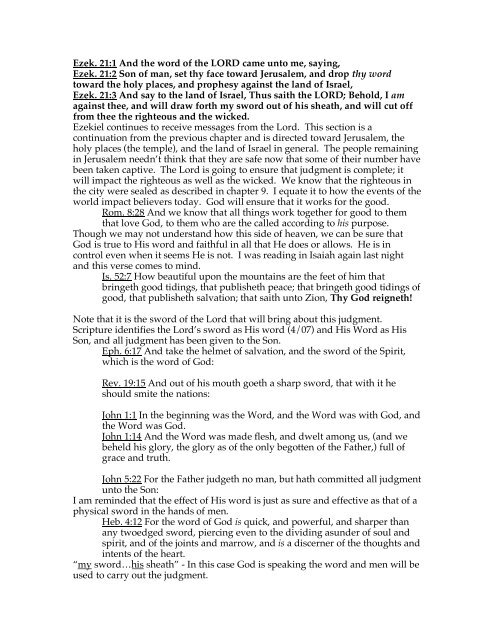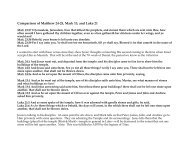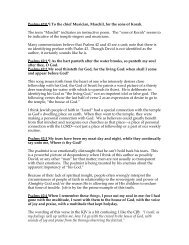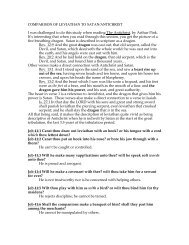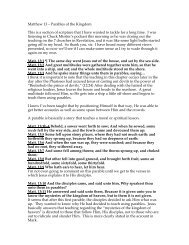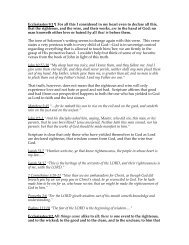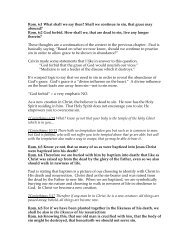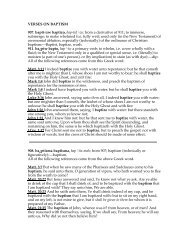Ezek. 21:1 And the word of the LORD came unto me, saying, Ezek ...
Ezek. 21:1 And the word of the LORD came unto me, saying, Ezek ...
Ezek. 21:1 And the word of the LORD came unto me, saying, Ezek ...
Create successful ePaper yourself
Turn your PDF publications into a flip-book with our unique Google optimized e-Paper software.
<strong>Ezek</strong>. <strong>21</strong>:1 <strong>And</strong> <strong>the</strong> <strong>word</strong> <strong>of</strong> <strong>the</strong> <strong>LORD</strong> <strong>ca<strong>me</strong></strong> <strong>unto</strong> <strong>me</strong>, <strong>saying</strong>,<br />
<strong>Ezek</strong>. <strong>21</strong>:2 Son <strong>of</strong> man, set thy face toward Jerusalem, and drop thy <strong>word</strong><br />
toward <strong>the</strong> holy places, and prophesy against <strong>the</strong> land <strong>of</strong> Israel,<br />
<strong>Ezek</strong>. <strong>21</strong>:3 <strong>And</strong> say to <strong>the</strong> land <strong>of</strong> Israel, Thus saith <strong>the</strong> <strong>LORD</strong>; Behold, I am<br />
against <strong>the</strong>e, and will draw forth my s<strong>word</strong> out <strong>of</strong> his sheath, and will cut <strong>of</strong>f<br />
from <strong>the</strong>e <strong>the</strong> righteous and <strong>the</strong> wicked.<br />
<strong>Ezek</strong>iel continues to receive <strong>me</strong>ssages from <strong>the</strong> Lord. This section is a<br />
continuation from <strong>the</strong> previous chapter and is directed toward Jerusalem, <strong>the</strong><br />
holy places (<strong>the</strong> temple), and <strong>the</strong> land <strong>of</strong> Israel in general. The people remaining<br />
in Jerusalem needn’t think that <strong>the</strong>y are safe now that so<strong>me</strong> <strong>of</strong> <strong>the</strong>ir number have<br />
been taken captive. The Lord is going to ensure that judg<strong>me</strong>nt is complete; it<br />
will impact <strong>the</strong> righteous as well as <strong>the</strong> wicked. We know that <strong>the</strong> righteous in<br />
<strong>the</strong> city were sealed as described in chapter 9. I equate it to how <strong>the</strong> events <strong>of</strong> <strong>the</strong><br />
world impact believers today. God will ensure that it works for <strong>the</strong> good.<br />
Rom. 8:28 <strong>And</strong> we know that all things work toge<strong>the</strong>r for good to <strong>the</strong>m<br />
that love God, to <strong>the</strong>m who are <strong>the</strong> called according to his purpose.<br />
Though we may not understand how this side <strong>of</strong> heaven, we can be sure that<br />
God is true to His <strong>word</strong> and faithful in all that He does or allows. He is in<br />
control even when it seems He is not. I was reading in Isaiah again last night<br />
and this verse co<strong>me</strong>s to mind.<br />
Is. 52:7 How beautiful upon <strong>the</strong> mountains are <strong>the</strong> feet <strong>of</strong> him that<br />
bringeth good tidings, that publisheth peace; that bringeth good tidings <strong>of</strong><br />
good, that publisheth salvation; that saith <strong>unto</strong> Zion, Thy God reigneth!<br />
Note that it is <strong>the</strong> s<strong>word</strong> <strong>of</strong> <strong>the</strong> Lord that will bring about this judg<strong>me</strong>nt.<br />
Scripture identifies <strong>the</strong> Lord’s s<strong>word</strong> as His <strong>word</strong> (4/07) and His Word as His<br />
Son, and all judg<strong>me</strong>nt has been given to <strong>the</strong> Son.<br />
Eph. 6:17 <strong>And</strong> take <strong>the</strong> hel<strong>me</strong>t <strong>of</strong> salvation, and <strong>the</strong> s<strong>word</strong> <strong>of</strong> <strong>the</strong> Spirit,<br />
which is <strong>the</strong> <strong>word</strong> <strong>of</strong> God:<br />
Rev. 19:15 <strong>And</strong> out <strong>of</strong> his mouth goeth a sharp s<strong>word</strong>, that with it he<br />
should smite <strong>the</strong> nations:<br />
John 1:1 In <strong>the</strong> beginning was <strong>the</strong> Word, and <strong>the</strong> Word was with God, and<br />
<strong>the</strong> Word was God.<br />
John 1:14 <strong>And</strong> <strong>the</strong> Word was made flesh, and dwelt among us, (and we<br />
beheld his glory, <strong>the</strong> glory as <strong>of</strong> <strong>the</strong> only begotten <strong>of</strong> <strong>the</strong> Fa<strong>the</strong>r,) full <strong>of</strong><br />
grace and truth.<br />
John 5:22 For <strong>the</strong> Fa<strong>the</strong>r judgeth no man, but hath committed all judg<strong>me</strong>nt<br />
<strong>unto</strong> <strong>the</strong> Son:<br />
I am reminded that <strong>the</strong> effect <strong>of</strong> His <strong>word</strong> is just as sure and effective as that <strong>of</strong> a<br />
physical s<strong>word</strong> in <strong>the</strong> hands <strong>of</strong> <strong>me</strong>n.<br />
Heb. 4:12 For <strong>the</strong> <strong>word</strong> <strong>of</strong> God is quick, and powerful, and sharper than<br />
any twoedged s<strong>word</strong>, piercing even to <strong>the</strong> dividing asunder <strong>of</strong> soul and<br />
spirit, and <strong>of</strong> <strong>the</strong> joints and marrow, and is a discerner <strong>of</strong> <strong>the</strong> thoughts and<br />
intents <strong>of</strong> <strong>the</strong> heart.<br />
“my s<strong>word</strong>…his sheath” - In this case God is speaking <strong>the</strong> <strong>word</strong> and <strong>me</strong>n will be<br />
used to carry out <strong>the</strong> judg<strong>me</strong>nt.
<strong>Ezek</strong>. <strong>21</strong>:4 Seeing <strong>the</strong>n that I will cut <strong>of</strong>f from <strong>the</strong>e <strong>the</strong> righteous and <strong>the</strong><br />
wicked, <strong>the</strong>refore shall my s<strong>word</strong> go forth out <strong>of</strong> his sheath against all flesh<br />
from <strong>the</strong> south to <strong>the</strong> north:<br />
<strong>Ezek</strong>. <strong>21</strong>:5 That all flesh may know that I <strong>the</strong> <strong>LORD</strong> have drawn forth my<br />
s<strong>word</strong> out <strong>of</strong> his sheath: it shall not return any more.<br />
Again, emphasis is made that <strong>the</strong> judg<strong>me</strong>nt will be complete according to God’s<br />
<strong>word</strong>. Everyone in <strong>the</strong> land will be affected in so<strong>me</strong> way, i.e., death by s<strong>word</strong>,<br />
famine, pestilence, captivity, etc. This is necessary to <strong>the</strong> testimony <strong>of</strong> <strong>the</strong> truth<br />
<strong>of</strong> God’s <strong>word</strong>.<br />
“it shall not return any more” – Obviously, this is not a state<strong>me</strong>nt <strong>of</strong> non-stop<br />
judg<strong>me</strong>nt. In reading through <strong>the</strong> different translations it would seem that it is a<br />
state<strong>me</strong>nt that <strong>the</strong> declared judg<strong>me</strong>nt will be completed with this stroke <strong>of</strong> His<br />
s<strong>word</strong>. When Neb shows up on <strong>the</strong> scene this ti<strong>me</strong>, he will not have to return to<br />
complete <strong>the</strong> job. In o<strong>the</strong>r <strong>word</strong>s, <strong>the</strong> s<strong>word</strong> will not be shea<strong>the</strong>d until <strong>the</strong><br />
declared judg<strong>me</strong>nt has been completed.<br />
<strong>Ezek</strong>. <strong>21</strong>:6 Sigh <strong>the</strong>refore, thou son <strong>of</strong> man, with <strong>the</strong> breaking <strong>of</strong> thy loins; and<br />
with bitterness sigh before <strong>the</strong>ir eyes.<br />
<strong>Ezek</strong>. <strong>21</strong>:7 <strong>And</strong> it shall be, when <strong>the</strong>y say <strong>unto</strong> <strong>the</strong>e, Wherefore sighest thou<br />
that thou shalt answer, For <strong>the</strong> tidings; because it co<strong>me</strong>th: and every heart shall<br />
<strong>me</strong>lt, and all hands shall be feeble, and every spirit shall faint, and all knees<br />
shall be weak as water: behold, it co<strong>me</strong>th, and shall be brought to pass, saith<br />
<strong>the</strong> Lord GOD.<br />
The Hebrew for <strong>the</strong> <strong>word</strong> sigh indicates to “groan or mourn.” The loins are<br />
equated with <strong>the</strong> reins in humans, according to Webster; this would be<br />
referencing <strong>the</strong> place <strong>of</strong> “affections and passions.” That would explain why<br />
so<strong>me</strong> <strong>of</strong> <strong>the</strong> translations reference a broken heart. The point is that <strong>Ezek</strong>iel is to<br />
physically depict an attitude <strong>of</strong> deep sorrow and anguish before <strong>the</strong> people.<br />
When <strong>the</strong>y ask him what is wrong, he is to answer that it is because <strong>of</strong> <strong>the</strong><br />
<strong>me</strong>ssage <strong>of</strong> God’s <strong>word</strong>. That <strong>me</strong>ssage is <strong>me</strong>ant to strike utter fear in <strong>the</strong> heart <strong>of</strong><br />
all those in Judah because <strong>the</strong> ti<strong>me</strong> <strong>of</strong> God’s longsuffering has ended and <strong>the</strong><br />
ti<strong>me</strong> <strong>of</strong> judg<strong>me</strong>nt has co<strong>me</strong>. It would also be devastating news to <strong>the</strong> captives<br />
who held out hope for <strong>the</strong>ir ho<strong>me</strong>land and <strong>the</strong>ir loved ones at ho<strong>me</strong>.<br />
<strong>Ezek</strong>. <strong>21</strong>:8 Again <strong>the</strong> <strong>word</strong> <strong>of</strong> <strong>the</strong> <strong>LORD</strong> <strong>ca<strong>me</strong></strong> <strong>unto</strong> <strong>me</strong>, <strong>saying</strong>,<br />
<strong>Ezek</strong>. <strong>21</strong>:9 Son <strong>of</strong> man, prophesy, and say, Thus saith <strong>the</strong> <strong>LORD</strong>; Say, A s<strong>word</strong>,<br />
a s<strong>word</strong> is sharpened, and also furbished:<br />
<strong>Ezek</strong>. <strong>21</strong>:10 It is sharpened to make a sore slaughter; it is furbished that it may<br />
glitter: should we <strong>the</strong>n make mirth it contemneth <strong>the</strong> rod <strong>of</strong> my son, as every<br />
tree.<br />
Sharpening and furbishing a s<strong>word</strong> is making preparation to ensure <strong>the</strong><br />
effectiveness <strong>of</strong> <strong>the</strong> weapon when wielded. We know that Nebuchadnezzar (and<br />
his armies) is <strong>the</strong> s<strong>word</strong> being referenced. The Hebrew for contemneth states “to<br />
spurn or disdain.” “My son” is a reference to Israel/Judah.<br />
Ex. 4:22 <strong>And</strong> thou shalt say <strong>unto</strong> Pharaoh, Thus saith <strong>the</strong> <strong>LORD</strong>, Israel is<br />
my son, even my firstborn:
The Hebrew for rod includes a reference to “branch and scepter” and would<br />
seem to be a reference to <strong>the</strong> king or ruler. In o<strong>the</strong>r <strong>word</strong>s, Neb is not<br />
intimidated in any way by <strong>the</strong> leadership <strong>of</strong> Judah; in fact, he feared no o<strong>the</strong>r<br />
ruler (i.e., every tree).<br />
<strong>Ezek</strong>. <strong>21</strong>:11 <strong>And</strong> he hath given it to be furbished, that it may be handled: this<br />
s<strong>word</strong> is sharpened, and it is furbished, to give it into <strong>the</strong> hand <strong>of</strong> <strong>the</strong> slayer.<br />
<strong>Ezek</strong>. <strong>21</strong>:12 Cry and howl, son <strong>of</strong> man: for it shall be upon my people, it shall<br />
be upon all <strong>the</strong> princes <strong>of</strong> Israel: terrors by reason <strong>of</strong> <strong>the</strong> s<strong>word</strong> shall be upon<br />
my people: smite <strong>the</strong>refore upon thy thigh.<br />
<strong>Ezek</strong>. <strong>21</strong>:13 Because it is a trial, and what if <strong>the</strong> s<strong>word</strong> contemn even <strong>the</strong> rod it<br />
shall be no more, saith <strong>the</strong> Lord GOD.<br />
The power <strong>of</strong> God’s s<strong>word</strong>, His <strong>word</strong>, is being given to Nebuchadnezzar, <strong>the</strong><br />
slayer. It is being given to Neb specifically to wreak judg<strong>me</strong>nt and destruction in<br />
<strong>the</strong> land <strong>of</strong> Judah and its inhabitants. Notice <strong>the</strong> state<strong>me</strong>nt <strong>of</strong> ownership—“my<br />
people.” God is faithful to His <strong>word</strong>; He made a covenant with Abraham and<br />
His Son, Jesus, that will not be thwarted by <strong>the</strong> disobedience and rejection <strong>of</strong><br />
Abraham’s descendants.<br />
Gal. 3:16 Now to Abraham and his seed were <strong>the</strong> promises made. He saith<br />
not, <strong>And</strong> to seeds, as <strong>of</strong> many; but as <strong>of</strong> one, <strong>And</strong> to thy seed, which is<br />
Christ.<br />
To smite <strong>the</strong> thigh is an action <strong>of</strong> grief and remorse; this should be <strong>the</strong> response<br />
<strong>of</strong> <strong>the</strong> people to God’s <strong>me</strong>ssage through <strong>Ezek</strong>iel.<br />
Verse 13 is hard to get a handle on; every translation is a bit different. This<br />
judg<strong>me</strong>nt will also serve as a trial, a test or examination. It will separate those<br />
who are repentant and remorseful from <strong>the</strong> disobedient hard <strong>of</strong> heart. The<br />
s<strong>word</strong> will strike at <strong>the</strong> rod, which at this ti<strong>me</strong> was Zedekiah; he was to be <strong>the</strong><br />
last king <strong>of</strong> Judah. The phrase “it shall be no more” seems to reference <strong>the</strong> fact<br />
that no kings ruled in Judah/Israel after <strong>the</strong> Babylonian captivity. The next king<br />
to rule in Israel will be Jesus, <strong>the</strong> son <strong>of</strong> David, <strong>the</strong> Son <strong>of</strong> God, during <strong>the</strong> 1000-<br />
year millennial reign.<br />
Is. 9:6 For <strong>unto</strong> us a child is born, <strong>unto</strong> us a son is given: and <strong>the</strong><br />
govern<strong>me</strong>nt shall be upon his shoulder: and his na<strong>me</strong> shall be called<br />
Wonderful, Counsellor, The mighty God, The everlasting Fa<strong>the</strong>r, The<br />
Prince <strong>of</strong> Peace.<br />
Is. 9:7 Of <strong>the</strong> increase <strong>of</strong> his govern<strong>me</strong>nt and peace <strong>the</strong>re shall be no end,<br />
upon <strong>the</strong> throne <strong>of</strong> David, and upon his kingdom, to order it, and to<br />
establish it with judg<strong>me</strong>nt and with justice from henceforth even for ever.<br />
The zeal <strong>of</strong> <strong>the</strong> <strong>LORD</strong> <strong>of</strong> hosts will perform this.<br />
Luke 1:31 <strong>And</strong>, behold, thou shalt conceive in thy womb, and bring forth a<br />
son, and shalt call his na<strong>me</strong> JESUS.<br />
Luke 1:32 He shall be great, and shall be called <strong>the</strong> Son <strong>of</strong> <strong>the</strong> Highest: and<br />
<strong>the</strong> Lord God shall give <strong>unto</strong> him <strong>the</strong> throne <strong>of</strong> his fa<strong>the</strong>r David:
Rev. 20:4 <strong>And</strong> I saw thrones, and <strong>the</strong>y sat upon <strong>the</strong>m, and judg<strong>me</strong>nt was<br />
given <strong>unto</strong> <strong>the</strong>m: and I saw <strong>the</strong> souls <strong>of</strong> <strong>the</strong>m that were beheaded for <strong>the</strong><br />
witness <strong>of</strong> Jesus, and for <strong>the</strong> <strong>word</strong> <strong>of</strong> God, and which had not worshipped<br />
<strong>the</strong> beast, nei<strong>the</strong>r his image, nei<strong>the</strong>r had received his mark upon <strong>the</strong>ir<br />
foreheads, or in <strong>the</strong>ir hands; and <strong>the</strong>y lived and reigned with Christ a<br />
thousand years.<br />
<strong>Ezek</strong>. <strong>21</strong>:14 Thou <strong>the</strong>refore, son <strong>of</strong> man, prophesy, and smite thine hands<br />
toge<strong>the</strong>r, and let <strong>the</strong> s<strong>word</strong> be doubled <strong>the</strong> third ti<strong>me</strong>, <strong>the</strong> s<strong>word</strong> <strong>of</strong> <strong>the</strong> slain: it<br />
is <strong>the</strong> s<strong>word</strong> <strong>of</strong> <strong>the</strong> great <strong>me</strong>n that are slain, which entereth into <strong>the</strong>ir privy<br />
chambers.<br />
<strong>Ezek</strong>. <strong>21</strong>:15 I have set <strong>the</strong> point <strong>of</strong> <strong>the</strong> s<strong>word</strong> against all <strong>the</strong>ir gates, that <strong>the</strong>ir<br />
heart may faint, and <strong>the</strong>ir ruins be multiplied: ah! it is made bright, it is<br />
wrapped up for <strong>the</strong> slaughter.<br />
To smite <strong>the</strong> hands is much different than to clap <strong>the</strong> hands. To smite <strong>the</strong> hands<br />
is an expression <strong>of</strong> anger. When I did a <strong>word</strong> search, <strong>the</strong> best example was found<br />
in Numbers and is supported below in verse 17.<br />
Num. 24:10 <strong>And</strong> Balak’s anger was kindled against Balaam, and he smote<br />
his hands toge<strong>the</strong>r:<br />
<strong>Ezek</strong>iel is declaring God’s anger with His people.<br />
“let <strong>the</strong> s<strong>word</strong> be doubled <strong>the</strong> third ti<strong>me</strong>” – Adam Clarke’s com<strong>me</strong>ntary made<br />
<strong>the</strong> point that Nebuchadnezzar <strong>ca<strong>me</strong></strong> against Judah three ti<strong>me</strong>s: against<br />
Jehoiakim, against Jeconiah, and against Zedekiah.<br />
When Neb co<strong>me</strong>s against Judah this last ti<strong>me</strong>, no one will be able to hide from<br />
<strong>the</strong> s<strong>word</strong> God has placed in his hand. God will see that all <strong>of</strong> <strong>the</strong>ir defenses are<br />
breached, fear will be struck in every heart, and more ruins will result from <strong>the</strong><br />
attack. God’s s<strong>word</strong> is going to be publicly and effectively wielded.<br />
<strong>Ezek</strong>. <strong>21</strong>:16 Go <strong>the</strong>e one way or o<strong>the</strong>r, ei<strong>the</strong>r on <strong>the</strong> right hand, or on <strong>the</strong> left,<br />
whi<strong>the</strong>rsoever thy face is set.<br />
Thee is a reference to <strong>the</strong> s<strong>word</strong>, Neb. The “right” hand is a reference to <strong>the</strong><br />
south, and <strong>the</strong> “left” hand is a reference to <strong>the</strong> north. In o<strong>the</strong>r <strong>word</strong>s,<br />
Nebuchadnezzar can choose to strike in any direction and he will be successful.<br />
<strong>Ezek</strong>. <strong>21</strong>:17 I will also smite mine hands toge<strong>the</strong>r, and I will cause my fury to<br />
rest: I <strong>the</strong> <strong>LORD</strong> have said it.<br />
The beautiful truth <strong>of</strong> this verse is that <strong>the</strong> judg<strong>me</strong>nt will co<strong>me</strong> to an end.<br />
Though his judg<strong>me</strong>nt is a result <strong>of</strong> His anger, God’s fury will finally rest (settle<br />
down, cease).<br />
<strong>Ezek</strong>. <strong>21</strong>:18 The <strong>word</strong> <strong>of</strong> <strong>the</strong> <strong>LORD</strong> <strong>ca<strong>me</strong></strong> <strong>unto</strong> <strong>me</strong> again, <strong>saying</strong>,<br />
<strong>Ezek</strong>. <strong>21</strong>:19 Also, thou son <strong>of</strong> man, appoint <strong>the</strong>e two ways, that <strong>the</strong> s<strong>word</strong> <strong>of</strong> <strong>the</strong><br />
king <strong>of</strong> Babylon may co<strong>me</strong>: both twain shall co<strong>me</strong> forth out <strong>of</strong> one land: and<br />
choose thou a place, choose it at <strong>the</strong> head <strong>of</strong> <strong>the</strong> way to <strong>the</strong> city.<br />
<strong>Ezek</strong>. <strong>21</strong>:20 Appoint a way, that <strong>the</strong> s<strong>word</strong> may co<strong>me</strong> to Rabbath <strong>of</strong> <strong>the</strong><br />
Ammonites, and to Judah in Jerusalem <strong>the</strong> defenced.
<strong>Ezek</strong>iel receives yet ano<strong>the</strong>r <strong>me</strong>ssage from <strong>the</strong> Lord. The <strong>word</strong>ing <strong>of</strong> <strong>the</strong> KJV is a<br />
bit confusing; I like <strong>the</strong> <strong>word</strong>ing <strong>of</strong> <strong>the</strong> NLT <strong>the</strong> best.<br />
“Son <strong>of</strong> man, make a map and trace two routes on it for <strong>the</strong> s<strong>word</strong> <strong>of</strong><br />
Babylon’s king to follow. Put a signpost on <strong>the</strong> road that co<strong>me</strong>s out <strong>of</strong><br />
Babylon where <strong>the</strong> road forks into two— one road going to Ammon and<br />
its capital, Rabbah, and <strong>the</strong> o<strong>the</strong>r to Judah and fortified Jerusalem.<br />
<strong>Ezek</strong>. <strong>21</strong>:<strong>21</strong> For <strong>the</strong> king <strong>of</strong> Babylon stood at <strong>the</strong> parting <strong>of</strong> <strong>the</strong> way, at <strong>the</strong> head<br />
<strong>of</strong> <strong>the</strong> two ways, to use divination: he made his arrows bright, he consulted<br />
with images, he looked in <strong>the</strong> liver.<br />
<strong>Ezek</strong>. <strong>21</strong>:22 At his right hand was <strong>the</strong> divination for Jerusalem, to appoint<br />
captains, to open <strong>the</strong> mouth in <strong>the</strong> slaughter, to lift up <strong>the</strong> voice with shouting,<br />
to appoint battering rams against <strong>the</strong> gates, to cast a mount, and to build a fort.<br />
<strong>Ezek</strong>. <strong>21</strong>:23 <strong>And</strong> it shall be <strong>unto</strong> <strong>the</strong>m as a false divination in <strong>the</strong>ir sight, to<br />
<strong>the</strong>m that have sworn oaths: but he will call to re<strong>me</strong>mbrance <strong>the</strong> iniquity, that<br />
<strong>the</strong>y may be taken.<br />
<strong>Ezek</strong>iel now speaks <strong>of</strong> <strong>the</strong> ti<strong>me</strong> when Neb will follow <strong>the</strong> route illustrated on <strong>the</strong><br />
map. When he gets to <strong>the</strong> fork in <strong>the</strong> road, he must choose whe<strong>the</strong>r to go toward<br />
Jerusalem or Rabbath. He decides to employ <strong>the</strong> use <strong>of</strong> divination.<br />
• “made his arrows bright” – The com<strong>me</strong>ntaries describe this process as<br />
placing <strong>the</strong> na<strong>me</strong>s <strong>of</strong> <strong>the</strong> cities to be attacked on arrows and <strong>the</strong>n shaking<br />
<strong>the</strong> quiver until one fell out. The first one to fall out would be <strong>the</strong> place<br />
attacked. It is similar to casting lots.<br />
• “consulted with images” – This would reference seeking guidance from<br />
idols <strong>of</strong> false gods.<br />
• “looked in <strong>the</strong> liver” – According to JFB <strong>the</strong>y looked into <strong>the</strong> liver to<br />
determine “<strong>the</strong> success, or failure, <strong>of</strong> an undertaking by <strong>the</strong> healthy, or<br />
unhealthy, state <strong>of</strong> <strong>the</strong> liver and entrails <strong>of</strong> a sacrifice.” According to <strong>the</strong><br />
NIV Com<strong>me</strong>ntary <strong>the</strong>y examined <strong>the</strong> color and its markings to determine<br />
which way to go.<br />
We know that it did not matter what <strong>me</strong>thod Neb chose to use; <strong>the</strong> Lord was<br />
going to ensure that he took <strong>the</strong> road to Jerusalem. He appointed his captains to<br />
give instructions for <strong>the</strong> taking <strong>of</strong> <strong>the</strong> city by using battering rams and building<br />
ramps and forts (or battering towers).<br />
Again, I think <strong>the</strong> <strong>word</strong>ing <strong>of</strong> <strong>the</strong> NLT gives a clearer picture <strong>of</strong> verse 23.<br />
“The people <strong>of</strong> Jerusalem will think it is a mistake, because <strong>of</strong> <strong>the</strong>ir treaty<br />
with <strong>the</strong> Babylonians. But <strong>the</strong> king <strong>of</strong> Babylon will remind <strong>the</strong> people <strong>of</strong><br />
<strong>the</strong>ir rebellion. Then he will attack and capture <strong>the</strong>m.”<br />
<strong>Ezek</strong>. <strong>21</strong>:24 Therefore thus saith <strong>the</strong> Lord GOD; Because ye have made your<br />
iniquity to be re<strong>me</strong>mbered, in that your transgressions are discovered, so that<br />
in all your doings your sins do appear; because, I say, that ye are co<strong>me</strong> to<br />
re<strong>me</strong>mbrance, ye shall be taken with <strong>the</strong> hand.<br />
The Lord is basically <strong>saying</strong> that <strong>the</strong> people <strong>of</strong> Judah have been so blatant and<br />
public with <strong>the</strong>ir disobedience to him and <strong>the</strong>ir wicked deeds, <strong>the</strong>y have brought<br />
judg<strong>me</strong>nt upon <strong>the</strong>mselves now; it cannot be delayed. Neb will be successful;<br />
many will be taken captive.
<strong>Ezek</strong>. <strong>21</strong>:25 <strong>And</strong> thou, pr<strong>of</strong>ane wicked prince <strong>of</strong> Israel, whose day is co<strong>me</strong>,<br />
when iniquity shall have an end,<br />
<strong>Ezek</strong>. <strong>21</strong>:26 Thus saith <strong>the</strong> Lord GOD; Remove <strong>the</strong> diadem, and take <strong>of</strong>f <strong>the</strong><br />
crown: this shall not be <strong>the</strong> sa<strong>me</strong>: exalt him that is low, and abase him that is<br />
high.<br />
<strong>Ezek</strong>. <strong>21</strong>:27 I will overturn, overturn, overturn, it: and it shall be no more, until<br />
he co<strong>me</strong> whose right it is; and I will give it him.<br />
The “prince <strong>of</strong> Israel” being referenced is Zedekiah. He was a wicked king as<br />
described in <strong>the</strong> book <strong>of</strong> Kings.<br />
2Kings 24:18 Zedekiah was twenty and one years old when he began to<br />
reign, and he reigned eleven years in Jerusalem. <strong>And</strong> his mo<strong>the</strong>r’s na<strong>me</strong><br />
was Hamutal, <strong>the</strong> daughter <strong>of</strong> Jeremiah <strong>of</strong> Libnah.<br />
2Kings 24:19 <strong>And</strong> he did that which was evil in <strong>the</strong> sight <strong>of</strong> <strong>the</strong> <strong>LORD</strong>,<br />
according to all that Jehoiakim had done.<br />
2Kings 24:20 For through <strong>the</strong> anger <strong>of</strong> <strong>the</strong> <strong>LORD</strong> it <strong>ca<strong>me</strong></strong> to pass in<br />
Jerusalem and Judah, until he had cast <strong>the</strong>m out from his presence, that<br />
Zedekiah rebelled against <strong>the</strong> king <strong>of</strong> Babylon.<br />
This sa<strong>me</strong> truth was repeated almost <strong>word</strong> for <strong>word</strong> in Jeremiah 52. Zedekiah<br />
was privileged to have <strong>the</strong> prophet Jeremiah ministering to him and <strong>the</strong> nation at<br />
this ti<strong>me</strong>, but he chose to reject <strong>the</strong> prophet and <strong>the</strong> Lord he represented. The<br />
Lord was going to take <strong>the</strong> throne away from Zedekiah (“abase him that is<br />
high”). The next one who would take <strong>the</strong> throne will be Jesus (<strong>the</strong> low one who<br />
would be exalted). Jesus is <strong>the</strong> one with <strong>the</strong> rightful claim to <strong>the</strong> throne, and God<br />
<strong>the</strong> Fa<strong>the</strong>r will ensure that He is given His rightful position. The act <strong>of</strong> exalting<br />
one that is low and abasing one that is high is from an earthly perspective <strong>of</strong> <strong>the</strong><br />
ones being referenced.<br />
“overturn, overturn, overturn….until” – This would indicate that <strong>the</strong> position <strong>of</strong><br />
King in Jerusalem/Judah/Israel will not be allowed to be reestablished until <strong>the</strong><br />
coming <strong>of</strong> <strong>the</strong> One who alone has <strong>the</strong> right to possess it, Jesus Christ, to set up<br />
His earthly kingdom. (cf com<strong>me</strong>nts at verses 11-13)<br />
<strong>Ezek</strong>. <strong>21</strong>:28 <strong>And</strong> thou, son <strong>of</strong> man, prophesy and say, Thus saith <strong>the</strong> Lord GOD<br />
concerning <strong>the</strong> Ammonites, and concerning <strong>the</strong>ir reproach; even say thou, The<br />
s<strong>word</strong>, <strong>the</strong> s<strong>word</strong> is drawn: for <strong>the</strong> slaughter it is furbished, to consu<strong>me</strong><br />
because <strong>of</strong> <strong>the</strong> glittering:<br />
<strong>Ezek</strong>. <strong>21</strong>:29 Whiles <strong>the</strong>y see vanity <strong>unto</strong> <strong>the</strong>e, whiles <strong>the</strong>y divine a lie <strong>unto</strong><br />
<strong>the</strong>e, to bring <strong>the</strong>e upon <strong>the</strong> necks <strong>of</strong> <strong>the</strong>m that are slain, <strong>of</strong> <strong>the</strong> wicked, whose<br />
day is co<strong>me</strong>, when <strong>the</strong>ir iniquity shall have an end.<br />
The <strong>word</strong>ing is <strong>of</strong>ten very hard to understand in <strong>the</strong> KJV, especially in <strong>the</strong><br />
prophets. I will again utilize <strong>the</strong> NLT.<br />
“<strong>And</strong> now, son <strong>of</strong> man, prophesy concerning <strong>the</strong> Ammonites and <strong>the</strong>ir<br />
mockery. Give <strong>the</strong>m this <strong>me</strong>ssage from <strong>the</strong> Sovereign <strong>LORD</strong>: My s<strong>word</strong> is<br />
drawn for your slaughter; it is sharpened to destroy, flashing like<br />
lightning! Your magicians and false prophets have given false visions and<br />
told lies about <strong>the</strong> s<strong>word</strong>. <strong>And</strong> now it will fall with even greater force on<br />
<strong>the</strong> wicked for whom <strong>the</strong> day <strong>of</strong> final reckoning has co<strong>me</strong>.”<br />
The Ammonites were descendants <strong>of</strong> Lot through his daughter. This nation<br />
established itself as enemies <strong>of</strong> Israel almost from its beginnings. They refused to
make provision for <strong>the</strong> children <strong>of</strong> Israel during <strong>the</strong>ir exodus from Egypt. At<br />
least one <strong>of</strong> Solomon’s wives, <strong>the</strong> mo<strong>the</strong>r <strong>of</strong> Rehoboam, was an Ammonite.<br />
2Chr. 12:13 So king Rehoboam streng<strong>the</strong>ned himself in Jerusalem, and<br />
reigned: for Rehoboam was one and forty years old when he began to<br />
reign, and he reigned seventeen years in Jerusalem, <strong>the</strong> city which <strong>the</strong><br />
<strong>LORD</strong> had chosen out <strong>of</strong> all <strong>the</strong> tribes <strong>of</strong> Israel, to put his na<strong>me</strong> <strong>the</strong>re. <strong>And</strong><br />
his mo<strong>the</strong>r’s na<strong>me</strong> was Naamah an Ammonitess.<br />
The Ammonites worshipped Molech, <strong>the</strong> awful deity to whom <strong>the</strong> people<br />
<strong>of</strong>fered <strong>the</strong>ir children as sacrifices. Solomon was guilty <strong>of</strong> following after this<br />
god.<br />
1Kings 11:5 For Solomon went after Ashtoreth <strong>the</strong> goddess <strong>of</strong> <strong>the</strong><br />
Zidonians, and after Milcom <strong>the</strong> abomination <strong>of</strong> <strong>the</strong> Ammonites.<br />
1Kings 11:6 <strong>And</strong> Solomon did evil in <strong>the</strong> sight <strong>of</strong> <strong>the</strong> <strong>LORD</strong>, and went not<br />
fully after <strong>the</strong> <strong>LORD</strong>, as did David his fa<strong>the</strong>r.<br />
1Kings 11:7 Then did Solomon build an high place for Chemosh, <strong>the</strong><br />
abomination <strong>of</strong> Moab, in <strong>the</strong> hill that is before Jerusalem, and for Molech,<br />
<strong>the</strong> abomination <strong>of</strong> <strong>the</strong> children <strong>of</strong> Ammon.<br />
(What a sad com<strong>me</strong>ntary on a man to whom God had given so much.)<br />
As <strong>the</strong> leader or king, so go his followers or subjects.<br />
<strong>Ezek</strong>. <strong>21</strong>:30 Shall I cause it to return into his sheath I will judge <strong>the</strong>e in <strong>the</strong><br />
place where thou wast created, in <strong>the</strong> land <strong>of</strong> thy nativity.<br />
<strong>Ezek</strong>. <strong>21</strong>:31 <strong>And</strong> I will pour out mine indignation upon <strong>the</strong>e, I will blow<br />
against <strong>the</strong>e in <strong>the</strong> fire <strong>of</strong> my wrath, and deliver <strong>the</strong>e into <strong>the</strong> hand <strong>of</strong> brutish<br />
<strong>me</strong>n, and skilful to destroy.<br />
<strong>Ezek</strong>. <strong>21</strong>:32 Thou shalt be for fuel to <strong>the</strong> fire; thy blood shall be in <strong>the</strong> midst <strong>of</strong><br />
<strong>the</strong> land; thou shalt be no more re<strong>me</strong>mbered: for I <strong>the</strong> <strong>LORD</strong> have spoken it.<br />
Because <strong>of</strong> <strong>the</strong>ir treat<strong>me</strong>nt <strong>of</strong> God’s people and <strong>the</strong> wickedness that <strong>the</strong>y<br />
introduced to Israel through <strong>the</strong> worship <strong>of</strong> <strong>the</strong>ir false gods, <strong>the</strong> Lord had<br />
determined that His s<strong>word</strong> <strong>of</strong> judg<strong>me</strong>nt would wipe out <strong>the</strong> Ammonites. They<br />
too would experience destruction at <strong>the</strong> hands <strong>of</strong> Nebuchadnezzar and his<br />
armies. Adam Clarke references Josephus that this happened about five years<br />
after <strong>the</strong> destruction <strong>of</strong> Jerusalem.<br />
Unlike <strong>the</strong> people <strong>of</strong> Judah, <strong>the</strong> people <strong>of</strong> Ammon would be destroyed “in <strong>the</strong><br />
land <strong>of</strong> thy nativity”; <strong>the</strong>y would not be taken captive. Their destruction would<br />
be complete (“thou shalt be no more re<strong>me</strong>mbered”). The Ammonites did not<br />
survive as a strong nation; <strong>the</strong>y were destroyed as prophesied. They weren’t<br />
completely destroyed as a people since so<strong>me</strong> <strong>of</strong> <strong>the</strong> children <strong>of</strong> Ammon will be<br />
around at <strong>the</strong> ti<strong>me</strong> <strong>of</strong> <strong>the</strong> antichrist according to Daniel 11.<br />
Dan. 11:41 He shall enter also into <strong>the</strong> glorious land, and many countries<br />
shall be overthrown: but <strong>the</strong>se shall escape out <strong>of</strong> his hand, even Edom,<br />
and Moab, and <strong>the</strong> chief <strong>of</strong> <strong>the</strong> children <strong>of</strong> Ammon.<br />
The children <strong>of</strong> Ammon would appear to be represented by a seg<strong>me</strong>nt <strong>of</strong> those in<br />
current day Jordan. The city <strong>of</strong> Amman, Jordan, today stands in <strong>the</strong> place <strong>of</strong><br />
Rabbath, <strong>the</strong> capital city <strong>of</strong> <strong>the</strong> Ammonites, from biblical ti<strong>me</strong>s.


